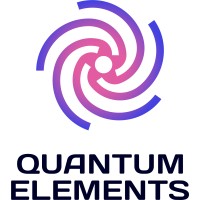Quantum Elements Launches AI-native Platform for Quantum Software and Hardware Development

Los Angeles-based startup emerges from stealth with funding from QDNL Participations, delivering first AI-native quantum development platform
We strongly believe Quantum Elements’ Constellation will become the dominant tool for developing quantum applications.”
LOS ANGELES, CA, UNITED STATES, October 22, 2025 /EINPresswire.com/ -- Quantum Elements, a Los Angeles-based quantum software start-up funded by QDNL Participations and USC Viterbi School of Engineering, today emerged from stealth and announced the launch of its AI-native quantum development platform to make fault-tolerant quantum computing more cost-effective, time-efficient and accessible, accelerating the path to valuable, real-world solutions. — Kris Kaczmarek, Investment Director at QDNL Participations
In what is the first quantum software development platform on the market built with AI integration at its core, Quantum Elements’ Constellation platform uses agentic AI, natural language prompts and a proprietary simulation back-end to develop large-scale simulation-driven machine learning models, generate code, debug and run quantum applications. As a result, users can more easily develop quantum solutions across pharma, energy, finance and other sectors today.
The hardware-specific, universal software also supports the largest and most advanced noisy-qubit simulator to date, allowing users to prototype quantum systems prior to purchasing hardware access, removing financial barriers for start-up companies and academics alike. In addition, users can pause and analyze errors with the simulator – unlike with physical quantum systems where programs can’t be paused in real time – to optimize their applications to particular hardware.
One of the first quantum start-ups based in the Los Angeles area, Quantum Elements was co-founded in 2023 by CEO Izhar Medalsy, Ph.D., a serial entrepreneur with years of technology and business experience; Chief Scientific Officer Prof. Daniel Lidar, University of Southern California (USC), the director and co-founder of the USC Center for Quantum Information Science & Technology; and Prof. Amir Yacoby, Harvard, member of the National Academy of Sciences.
The company has already built partnerships with top quantum companies such as Amazon and Rigetti, as well as academic partners like USC and UCLA.
“With our AI-powered platform, what took engineers weeks to calibrate, analyze or program in the past is now doable in mere hours,” Izhar said. “Paired with our state-of-the-art hardware specific quantum simulator, users can now simulate quantum computer prototypes and applications to gain confidence and then invest in access to quantum hardware.”
Following are perspectives on Quantum Elements and its platform:
“In classical computing, it has become apparent that engineers who don’t use AI-native coding tools like Cursor or Copilot risk being left behind. We expect the same will happen with quantum computers and strongly believe Quantum Elements’ Constellation will become the dominant tool for developing quantum applications.”
– Kris Kaczmarek, Investment Director at QDNL Participations
“Congratulations to Quantum Elements on this exciting moment. Since joining Rigetti’s Novera QPU Partner Program last year, we’ve had the opportunity to deepen our partnership with Quantum Elements to leverage their AI-powered tools in support of our engineering. Quantum Elements have demonstrated deep insights in modeling superconducting qubit systems to improve gate fidelity and we’re looking forward to the quantum error correction improvements their tools can enable.”
– Dr. Subodh Kulkarni, CEO, Rigetti Computing
“We’re excited to see Quantum Elements launch their platform, building useful tools for quantum computing and expanding what’s possible with our OPX1000 controller and QUA language.”
– Dr. Itamar Sivan, Co-founder and CEO of Quantum Machines
“We plan to collaborate with Quantum Elements to foster a symbiotic software environment for QuTiP (Quantum Toolbox in Python) users, ultimately benefiting the broader quantum simulation community.”
– Professor Franco Nori, QuTip software inventor, Riken Center for Quantum Computing in Japan
“Quantum Elements’ platform applies cutting-edge AI to abstract quantum computing processes, empowering its users to attain more cost-effective hardware innovation, to perform enhanced error correction, and to produce reliable logical qubits.”
– Seth Lloyd, Professor of Mechanical Engineering at MIT and renowned quantum information expert
For developers wishing to conduct a free trial of the Quantum Elements platform, or for investment inquiries, please email info@quantumelements.ai.
About QDNL Participations
QDNL Participations (QDNLP) is a $70 million specialized investment fund dedicated to investing in early-stage quantum technology companies worldwide. Its team brings a unique blend of top-tier scientific and technical expertise, with PhDs in Physics from institutions such as Oxford, Stanford, Harvard, Yale, and UC Berkeley. With a strong focus on quantum technology, QDNLP has extensive experience and a proven track record in investing in breakthrough technologies. Established in 2022 by General Partner Ton van ‘t Noordende, the fund’s investment team operates across the Netherlands, the UK, and the US. Follow QDNL Participations on LinkedIn or visit the firm’s website at https://www.qdnlparticipations.nl
About Quantum Elements
Founded in 2023 in Los Angeles, Quantum Elements seeks to transform the quantum computing industry by making the path to real-world commercial applications more efficient and cost-effective through its proprietary, AI-native software stack and world-leading simulator.
Brittney Kuhn
HKA Marketing Communications
+1 714-426-0444
brittney@hkamarcom.com
Legal Disclaimer:
EIN Presswire provides this news content "as is" without warranty of any kind. We do not accept any responsibility or liability for the accuracy, content, images, videos, licenses, completeness, legality, or reliability of the information contained in this article. If you have any complaints or copyright issues related to this article, kindly contact the author above.



